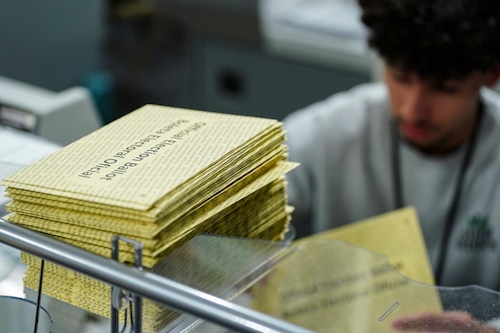On November 5, 2024, in the Lehigh County Government Center in Allentown, Lehigh County, Pennsylvania, voter registration staff sort mail-in votes. (For Spotlight PA, Matt Smith)Smith, Matt
HARRISBURG In the November election, Pennsylvania county elections officials rejected over 11,000 mail-in ballots for technical reasons, including thousands that were found to be in violation of the highly contested requirement that voters write precise, handwritten dates on the return envelopes.
According to Department of State data released this week, over 2,600 applicants were denied admission because their dates were incorrect, and roughly 2,100 were denied admission because they had no date at all.
The latest in a series of court disputes since mail-in voting was significantly expanded under a 2019 law, the Pennsylvania Supreme Court announced in mid-January that it will rule on whether the envelope date requirement violates a state constitutional provision that elections be free and equal.
According to the elections agency, over 3,500 ballots were rejected for not having a signature, and over 3,000 votes were not counted because voters neglected to place their ballots in a secret envelope. Additionally, after polls closed at 8 p.m. on Election Day, approximately 7,000 mail-in ballots that counties had rejected in November had arrived for counting.
Because they time stamp votes as they arrive and are aware of when they were shipped out, the county employees who oversee Pennsylvania elections don’t really use the outside envelope date. The dates are seen by Republicans who have supported them as an extra measure of security.
Compared to the November 2023 election, when roughly 8,000 votes were rejected for at least one of those four categories, the 11,000+ votes that were rejected for incorrect dates, no dates, no signatures, or no security envelopes is a significant increase. While 2023 saw lower voter turnout and just statewide judicial contests at the top of the ballot, 2024 saw a high turnout presidential election with a fought U.S. Senate race.
Secretary of State Al Schmidt stated on Friday that every vote is valuable and that it is unacceptable for even one to be rejected. We have therefore taken every precaution to reduce the likelihood that voters may make mistakes.
In an attempt to lower the rejection percentage, the Department of State conducted a voter education campaign and twice last year changed mail-in ballot envelopes. According to the organization, the proportion of returned postal ballots that were rejected decreased from over 2.4% in the April primary to roughly 1% in November.
Whether a voter is elderly or filling out this form while dropping their children off at school in the morning, we wanted to reduce the number of chances that they could make a mistake, Schmidt stated.
Vic Walczak, an attorney with the American Civil Liberties Union of Pennsylvania, stated that although there has been progress, there is still more that counties can do to further lower the number of rejected mail ballots.
According to Walczak, who is participating in the ongoing state Supreme Court case, it’s better than the rejection rate before to that since it’s 11,000 too many. We shouldn’t declare victory just yet, but it’s welcome and deserves celebration.
This November, almost 2 million Pennsylvanians voted by mail, and voters returned roughly 88% of the mail-in ballots.
According to Schmidt, voter education is a continuous process that must be carried out. And to anyone who truly cares about democracy, every ballot that is rejected—there has been only one rejected ballot in Pennsylvania—feels like a failure.

